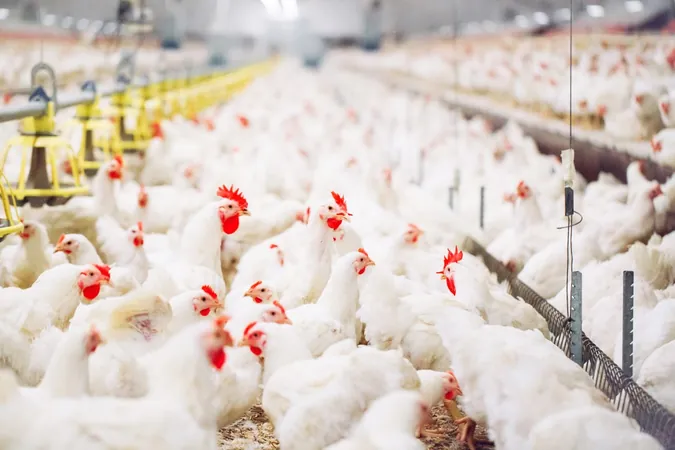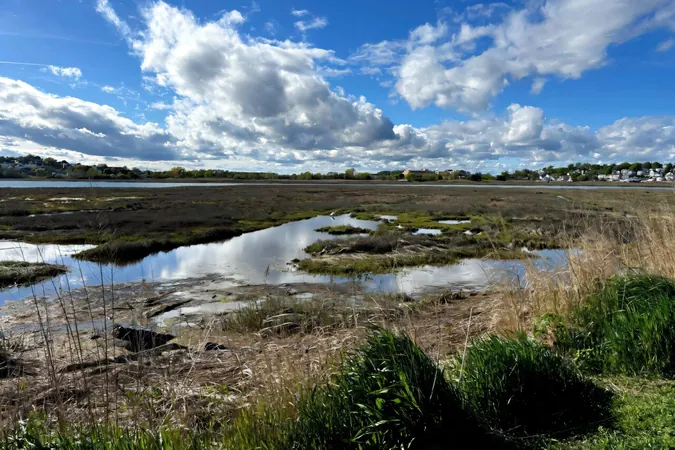
Highly Pathogenic Avian Influenza Spotted Again in Ottawa County—What You Need to Know!
2024-12-17
Author: Liam
Highly Pathogenic Avian Influenza Spotted Again in Ottawa County—What You Need to Know!
In a concerning development for Michigan's agriculture, the Michigan Department of Agriculture and Rural Development (MDARD) has confirmed the detection of highly pathogenic avian influenza (HPAI) in a commercial poultry facility located in Ottawa County. This marks the first occurrence of HPAI in Michigan poultry since May 2024, when the state dealt with its largest outbreak of the disease.
The state has also faced another hurdle as this is the second case of HPAI identified in Ottawa County since the disease was first reported in Michigan back in 2022. The significant implications of this detection underscore the urgency of robust biosecurity measures to protect both domestic poultry and public health.
MDARD Director Tim Boring emphasized the importance of implementing biosecurity measures, stating, “Slowing the spread of HPAI to protect human health is a top priority at MDARD.” Enhanced surveillance efforts and strict on-farm biosecurity protocols are viewed as pivotal strategies to curb the disease's potential impact on both animals and humans.
Dr. Natasha Bagdasarian, chief medical executive, echoed these sentiments, warning farm workers of the risks involved in handling infected animals. "Since this disease can affect both animals and their handlers, the use of personal protective equipment is crucial to safeguarding health," she noted.
HPAI is a highly contagious disease that can spread rapidly among flocks, primarily through wild birds, contaminated equipment, and caretaker clothing. To contain the outbreak, the affected facility is currently under quarantine, and affected birds will be depopulated to prevent further spread. These preventive measures are instrumental in maintaining the integrity and safety of the commercial food supply chain.
As we brace for colder weather, which is ideal for the virus's survival, State Veterinarian Dr. Nora Wineland is urging for the utmost caution. "Preventive actions such as keeping domestic birds away from wild populations, and regular cleaning and disinfecting of equipment are crucial," she stressed.
While the immediate public health risk is considered low by the U.S. Centers for Disease Control and Prevention, authorities are advising against complacency. Proper handling and thorough cooking of all poultry and eggs remain essential precautions for consumers.
Poultry owners, whether managing small backyard coops or large commercial operations, are urged to take proactive measures: - Ensure domestic birds are kept away from wild birds, preferably indoors or in an enclosed area. - Wash hands before and after handling birds and when transitioning between coops. - Disinfect footwear and equipment between uses. - Avoid sharing equipment or supplies between different farms or coops. - Use only treated well or municipal water for poultry drinking needs. - Secure poultry feed to prevent contamination from wild birds or rodents.
MDARD is actively collaborating with local, state, and federal partners to respond promptly to reports of sick domestic animals, thereby mitigating the risk of HPAI's spread.
If You Suspect HPAI: Act Quickly!
For domestic bird owners, it's crucial to monitor flocks for symptoms like sudden deaths, decreased egg production, or unusual behaviors. If you observe any such signs, contact MDARD at 800-292-3939 during the day or 517-373-0440 after hours.
Wild bird enthusiasts should also report unusual deaths in wild bird populations. Reports can be made through the Michigan Department of Natural Resources (DNR) using their Eyes in the Field app or by calling the Wildlife Disease Laboratory at 517-336-5030.
Stay Informed!
To receive timely updates about avian influenza in Michigan, subscribe on the MDARD website under the “Avian Influenza” section. Information regarding protective measures and HPAI prevention can also be found through the Michigan Department of Health and Human Services and the U.S. Department of Agriculture's websites.
Stay vigilant, as together we work to protect our avian population and ensure public safety!









 Brasil (PT)
Brasil (PT)
 Canada (EN)
Canada (EN)
 Chile (ES)
Chile (ES)
 España (ES)
España (ES)
 France (FR)
France (FR)
 Hong Kong (EN)
Hong Kong (EN)
 Italia (IT)
Italia (IT)
 日本 (JA)
日本 (JA)
 Magyarország (HU)
Magyarország (HU)
 Norge (NO)
Norge (NO)
 Polska (PL)
Polska (PL)
 Schweiz (DE)
Schweiz (DE)
 Singapore (EN)
Singapore (EN)
 Sverige (SV)
Sverige (SV)
 Suomi (FI)
Suomi (FI)
 Türkiye (TR)
Türkiye (TR)